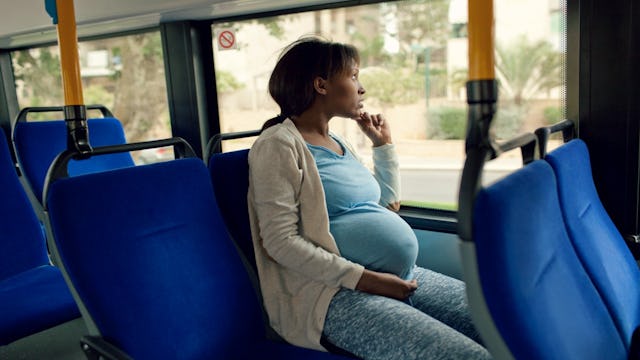This Shocking Documentary Sheds Light On The Need For Better Maternal Health Care

When I was in labor with my third son, everything was going swimmingly – until it wasn’t.
A sudden sense of hushed urgency filled the room, and I could tell that the fake “IT’S FINE, WE’RE FINE” smile frozen onto my husband’s face, meant to keep me calm, was thinly disguising his own fear. Medical technicians quickly filed in to take a sample of my blood; there was talk of a possible transfusion, and they had to know my blood type.
As it turns out, I had experienced a placental abruption – part of my placenta had detached prematurely from the uterine wall – and it could have caused serious complications for both my baby and me.
I’m one of the lucky ones, though. Thanks to proper medical intervention and quality care, my son was delivered normally with no lasting effects for either of us.
But what about those women who aren’t so lucky?
Every year around the world, a woman dies every two minutes due to complications from pregnancy and childbirth. But that’s just the tip of the iceberg. Let’s look at some other, equally-horrifying statistics compiled by nonprofit organization Every Mother Counts:
– 99% of maternal deaths happen in the developing world.
– The number of women dying in pregnancy and childbirth has nearly doubled in the last 25 years.
– Women of color are up to 4 times more likely to die during pregnancy and childbirth.
– The U.S. spends more per capita than any other country, yet we are the only industrialized nation with a consistently rising rate of maternal mortality.
So why, especially in a nation like ours, are so many women still dying from such complications?
The answer is multifaceted, but in short, it’s this: There’s a gross discrepancy in the prenatal (and postpartum) care that women from disadvantaged communities receive.
If you’re one of the lucky ones, like me, it’s easy to live in our insulated worldview and not even consider the plight of our fellow mothers who don’t have it so easy. But there’s a depressing, dangerous laundry list of barriers for these women, which keep the maternal mortality rate unacceptably high.
Access to pre- and post-natal care, for example. At the most basic, there’s the issue of transportation: being literally unable to find a ride to every doctor visit (and before you say “buses,” just stop to consider that is definitely not always an available option in many areas, and also envision schlepping your heavily pregnant self – sick or aching or swollen, through whatever kind of weather – to the nearest route). Many mothers in rural areas must travel for hours to receive even routine care.
Beyond that, there’s a dire shortage of maternal care providers. Midwives could fill the gaps, overseeing healthy, routine pregnancies and deliveries, except midwifery isn’t covered under most insurance plans. And speaking of insurance, that’s another huge issue: private insurance is prohibitively expensive, but the current administration’s rollback of the Medicaid expansion cuts coverage for vital women’s health services, forcing some women to relinquish care altogether.
Then there’s the disrespectful treatment and lack of dignity, the impression that these women deserve “less than.” The overuse of medical interventions such as inductions and C-sections can cause complications. The lack of prenatal education, which prevents women from planning and spacing pregnancies in the most healthy, proactive way. The endless, relentless financial, racial, and systemic barriers that keep women from having the pregnancy, birth, and postpartum support that they so critically need and deserve.
But though these challenges sometimes seem insurmountable, one organization is working tirelessly to overcome them: Every Mother Counts. Founded by Christy Turlington Burns, whose own trauma during the birth of her daughter inspired a focus on maternal health, Every Mother Counts seeks to improve conditions and mortality rates for under-served mothers (and mothers-to-be).
Their continuing series of short documentary films, Giving Birth in America, highlights the conditions facing women in various regions of the country – so far, New York, Florida, Montana, Louisiana, and California – from various walks of life. From city-dwelling New Yorkers to those living in the farthest reaches of Montana, flood-affected families in Louisiana to migrant farm workers in California, the documentaries share the intimate stories of mothers who at first glance may seem very different from us – but through these stories run a thread of familiarity that every mother will recognize.
You’ll be left stunned after watching the films, but, more importantly, you’ll be ready to rally for a cause you likely didn’t know was this urgent. These women need our support, and it’s up to us to lend our voices and take action.
The “What Can I Do?” section of the Every Mother Counts website walks you through the specifics of supporting each proposed legislative measure, and the “Policy and Advocacy” section makes it easy to keep updated on, and learn more about, ongoing legislative efforts.
One of the many proposed strategies is the MOMMIES (Maximizing Outcomes for Moms Through Medicaid Improvement and Enhancement of Services) Act, which – among other much-needed improvements – would extend CHIP and Medicaid coverage from 60 days to 365 days following birth, and increase Medicaid coverage for doula care.
“In 2018, there was unprecedented interest from Senators and Members of Congress in improving maternal health outcomes and equity,” says the site. Through the organization, and the efforts of people like you and me, we can strike while the proverbial iron is hot: voting for candidates who support these measures and other women’s health initiatives, raising awareness, volunteering, enacting the changes necessary to improve prenatal and postpartum care for every mother, regardless of her circumstances.
Pardon the pun, but it’s long overdue.
This article was originally published on